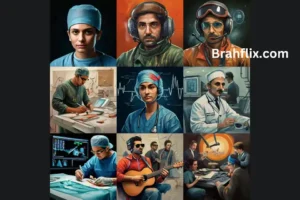Introduction
In today’s dynamic and ever-changing job market, understanding the Top 10 Professions in the World is essential for anyone looking to navigate their career path. This comprehensive article will explore various professions that not only promise financial stability but also provide personal fulfillment and societal impact. Whether you’re a recent graduate, considering a career change, or simply curious about the evolving job landscape, this guide will offer valuable insights.
Key Takeaways
- The top professions often reflect trends in technology, health care, and global demands.
- Understanding the skills required for these careers can help tailor your education and experience.
- Job satisfaction is heavily influenced by work-life balance, salary, and personal interests.
- Economic stability and growth potential are critical factors when considering a profession.
1. Healthcare Professionals
Healthcare professionals, including doctors, nurses, and medical technicians, are at the forefront of society’s needs. As populations age and healthcare technology evolves, the demand for skilled healthcare workers is projected to rise dramatically.
Key Skills and Requirements
- Education: Most roles require specialized education and training, including degrees in medicine or nursing.
- Soft Skills: Empathy, communication, and problem-solving abilities are crucial for patient care.
Job Outlook and Statistics
According to the U.S. Bureau of Labor Statistics (BLS), employment for healthcare occupations is expected to grow by 16% from 2020 to 2030, much faster than the average for all occupations. This growth is driven by an aging population, leading to increased demand for health services.
2. Technology Specialists

The technology sector continues to be one of the most lucrative and rapidly evolving fields. Positions such as software developers, data scientists, and cybersecurity experts are critical in the digital age.
Key Skills and Requirements
- Education: A degree in computer science or a related field is often necessary.
- Technical Skills: Proficiency in programming languages (like Python, Java, or C++) and data analysis tools.
Job Outlook and Statistics
The BLS projects that employment in computer and information technology occupations will grow by 13% from 2020 to 2030, reflecting the increasing reliance on technology across all sectors.
3. Engineering Professionals
Engineering encompasses various fields, including civil, mechanical, and electrical engineering. Engineers play a vital role in designing and maintaining the infrastructure and technology that society relies on.
Key Skills and Requirements
- Education: Most engineering roles require at least a bachelor’s degree in an engineering discipline.
- Analytical Skills: Engineers must possess strong analytical and mathematical skills.
Job Outlook and Statistics
The employment of engineers is projected to grow by 6% from 2020 to 2030, according to the BLS, with specific sectors like renewable energy witnessing more rapid growth.
4. Educators
Teaching is a noble profession that shapes future generations. Educators work in various settings, from elementary schools to universities, making it one of the top professions for those passionate about knowledge and development.
Key Skills and Requirements
- Education: Typically, a degree in education or the subject area you wish to teach is required.
- Communication Skills: Strong verbal and written communication skills are essential for effective teaching.
Job Outlook and Statistics
The demand for teachers is expected to grow, especially in subjects like mathematics, science, and special education. According to the BLS, the employment of teachers will grow by 7% from 2020 to 2030.
5. Financial Analysts
Financial analysts are key players in helping businesses make informed investment decisions. Their expertise is vital in navigating the complexities of global markets and financial instruments.
Key Skills and Requirements
- Education: A bachelor’s degree in finance, economics, or business administration is generally required.
- Analytical Skills: Strong analytical and mathematical skills are crucial for interpreting financial data.
Job Outlook and Statistics
The BLS projects that employment for financial analysts will grow by 6% from 2020 to 2030, driven by an increasing emphasis on investment performance and risk management.
6. Marketing and Sales Professionals
In an increasingly competitive marketplace, marketing and sales professionals play a crucial role in promoting products and services. Positions such as marketing managers, sales representatives, and digital marketers are in high demand.
Key Skills and Requirements
- Education: A degree in marketing, business, or communications is often preferred.
- Creativity: Creative thinking and a strong understanding of consumer behavior are key.
Job Outlook and Statistics
The marketing field is projected to grow by 10% from 2020 to 2030, driven by the digital revolution and changing consumer preferences.
7. Environmental Scientists
As awareness of climate change and environmental issues grows, the demand for environmental scientists has increased. These professionals work to protect the environment and public health through research and policy development.
Key Skills and Requirements
- Education: A degree in environmental science, biology, or a related field is often required.
- Research Skills: Strong analytical and research skills are necessary for conducting environmental studies.
Job Outlook and Statistics
The BLS projects employment for environmental scientists to grow by 8% from 2020 to 2030, reflecting the increasing need for environmental protection and sustainability efforts.
8. Skilled Trades
Skilled trades encompass various professions, including electricians, plumbers, and construction workers. These roles are essential for maintaining infrastructure and services.
Key Skills and Requirements
- Education: Many trades require vocational training or apprenticeships rather than a traditional college degree.
- Technical Skills: Practical skills and a good understanding of tools and machinery are vital.
Job Outlook and Statistics
The demand for skilled trades is expected to grow significantly, with the BLS projecting a 7% increase in employment for construction and extraction occupations from 2020 to 2030.
9. Data Analysts

Data analysts interpret complex data sets to help organizations make informed decisions. As companies increasingly rely on data for strategy, this profession has gained significant traction.
Key Skills and Requirements
- Education: A degree in statistics, mathematics, or a related field is often required.
- Technical Skills: Proficiency in data analysis tools (like Excel, SQL, or R) is essential.
Job Outlook and Statistics
The demand for data analysts is projected to grow by 25% from 2020 to 2030, reflecting the increasing importance of data-driven decision-making across industries.
10. Human Resource Managers
Human resource managers play a critical role in developing and implementing policies that support an organization’s workforce. Their work ensures that companies have the right talent in place.
Key Skills and Requirements
- Education: A bachelor’s degree in human resources, business administration, or a related field is often required.
- Interpersonal Skills: Strong interpersonal skills and a good understanding of labor laws are essential.
Job Outlook and Statistics
The employment of human resource managers is projected to grow by 9% from 2020 to 2030, driven by the need for effective workforce management and talent acquisition strategies.
Frequently Asked Questions
What are the highest-paying professions in the world?
Some of the highest-paying professions include medical doctors, surgeons, anesthesiologists, and corporate executives.
How do I choose the right profession for myself?
Consider your interests, skills, and market demand. Research various professions and seek internships or informational interviews to gain insights.
What skills are in demand for the future job market?
Skills such as critical thinking, emotional intelligence, and digital literacy are increasingly valued in the job market.
Are there professions that require less formal education?
Yes, many skilled trades and technical positions require vocational training or apprenticeships rather than a four-year degree.
How can I prepare for a career in one of these top professions?
Gain relevant education, seek internships or practical experience, and continuously develop your skills through training and professional development opportunities.
Conclusion
The Top 10 Professions in the World reflect the diverse opportunities available in today’s job market, driven by advancements in technology, healthcare needs, and environmental considerations. By understanding these careers and the skills required, you can make informed decisions about your professional future.
What are your thoughts on the professions listed? Are you considering a career in one of these fields? Let us know in the comments below and check out our other blogs for more insights and career advice!